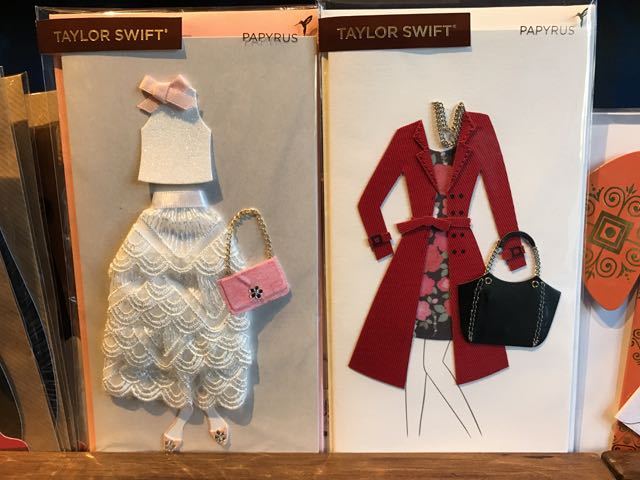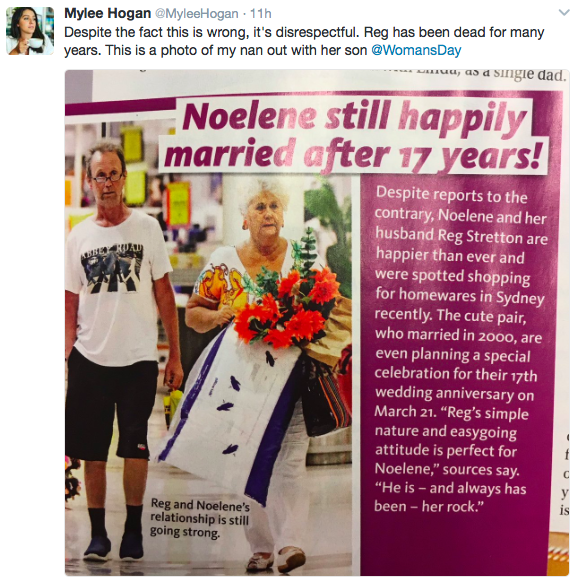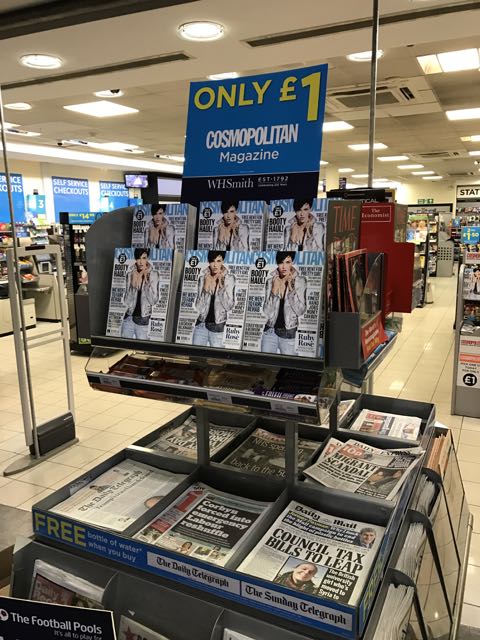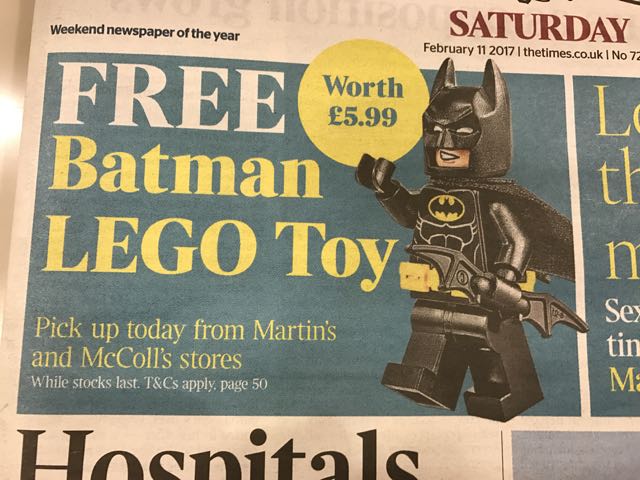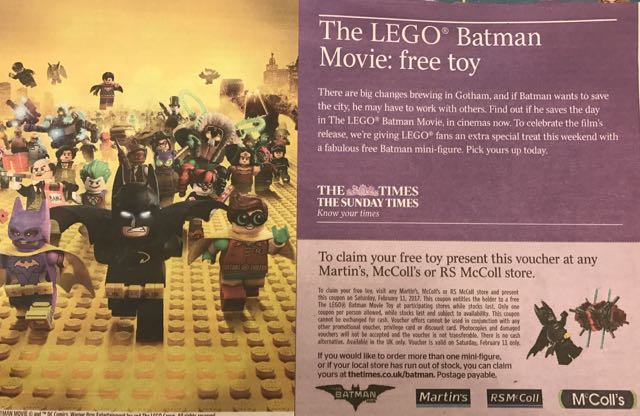Celebrity card designers
I have seen some amazing card designs at overseas trade shows this year, extraordinary designs, on point, different, fun, unique. And then there are celebrity card designs for which I suspect the publishers ay too high, like these:
Even though I am not the customer, I suspect these cards next to two of the best designs from an unknown designer targeting the same shopper would se the Taylor Swift cards remain unsold.
The cards are not bad. They are just not current to what cool designers are producing today. Sure, they have her name. But is that enough?
newsXpress finding new customers on TV
This latest newsXpress TV ad just finished airing. This is a brand building ad rather than a call to action. With the promoted products costing from $150.00 to $800.00, the ad has a subtlety that plays to a style collectors are drawn to. It worked a treat.
Promoting outside traditional seasonal occasions is important in my view. The more non-traditional reasons we can give for visiting our shops the better.
Selling these items in the price range noted changes shopper perception of the business. Most important than this, it changes your own perception.
FYI, people selling these are in the city and country, on the high street and in centres.
Mumbrella: Lottoland rejects ad standards ruling
Click here to see a Mumbrella report on Lottoland rejecting an Advertising Standards Board finding against it. I encourage newsagents to read the article. Lotto land come across as sensitive and precious.
Their ads need to be called out for what they are, including their appalling attack on small business newsagents.
Who needs a shop to sell lottery tickets?
Lottoland is a pure online and app play. Tatts (The Lott) has a strong online and app play. OzLotteries has a a strong online and app play. In the US there is online as well as self-serve machines like this one that does not age check and does not give change. These are all factors to consider when costing the capital expenditure demanded by Tatts.
Check out the vending machine I saw yesterday at the offices of New York Lottery and Gaming Commission:
What should newsagents do about those who ignore publisher promotion rules?
Last week I received an anonymous note following my posts here about people selling newspaper promotion sets online. In the email, the correspondent included banking and address details which I have edited of the post below. I am happy to share these details with publisher folk to investigate:
Hi Mark,
I’m a fellow newsagent and a follower on your blog, your recent posts regarding a select few rouge agents selling magazines on eBay drew my attention.
I have done some investigating and hope you can forward my findings to the relevant suppliers and stop this behaviour.
Excuse the long email as I outline my findings.
One seller in particular I noticed is prolific at selling News Limited Promotions and other current magazines often at below cost price, with free delivery.
Link to this seller’s profile:
http://www.ebay.com.au/sch/auton_goyck/m.html?I couldn’t find much initially, the item locations are mainly Carlton VIC, with a few others listings stating Sydney which are likely false too to throw off suspensions from News Limited.
Examples of the listings include the Roald Dahl Full set.
http://www.ebay.com.au/itm/The-MARVELLOUS-ROALD-DAHL-LIBRARY-set-14-books-case-advisor-courier-mail-/252760717924
We’re not allowed to sell without tokens and this eBay seller is selling for $39.99 inc postage.AFL Season Guide
http://www.ebay.com.au/itm/NEW-AFL-Record-Season-Guide-2017-By-Michael-Lovett-Paperback-Free-Shipping-/252762339055?
RRP $40 – Selling for $29.99 inc postagehttp://www.ebay.com.au/itm/OUR-WORLD-IN-CHARTS-UNDERSTANDING-THE-ECONOMY-MONEY-ALAN-KOHLER-/252688189246
RRP $30 – selling for $13 inc postageBy my calculations, with eBay and paypal fees close to 10% and postage for 1-3kg parcel close to $12. This seller must be doing dodgy returns as otherwise the items are being sold way below cost.
I created a fake account and purchased a small item, found the banking details.
In the checkout process, eBay actually linked me to another similar product which I discovered was the same seller with a different account :
http://www.ebay.com.au/sch/32168732/m.html?
This account has over 2300 listings for sale, mostly old magazines dating back to 2013 and around 600 stationary items from GNS all with the item location in Glenroy VIC.
The photos in some of the listings from these 2 accounts share the same floorboard in the background and I found the banking details matched too.
Quick check online showed no recent rental or sale history, presumably this seller own it, can’t really confirm it unless I do a title check but that has a fee.
With the AFL Season Guide I mentioned earlier, I bet not many newsagent’s receive over 12 copies for this title. I’m sure they are able to filter a list of newsagents receiving 12 or more (with a high history of returns) in Melbourne and cross check against Owner’s Names and address.
Hopefully this is enough of a lead to work with and you can forward this to the contacts at News Limited and Gordon Gotch who can do something about it, this character has obviously been around for a while given their feedback history.
There are of course other sellers on eBay selling magazines and promotion items, but none with the same scale and magnitude.
If the outcome from this finding leads to an appropriate action (ie a full audit on the identified newsagency account) , I would be willing to dig through the other sellers and gather more Intel.
Perhaps you can also share this on the blog and enlist some help. I myself do not seek any credit and wish to stay anonymous.
I, too, am concerned about people operating outside the rules when it comes to these promotions. It gives our channel a bad name.
For their part, publishers appear disinterested in what looks like rogue behaviour.
I welcome comments from others on this.
Any newsagents in Melbourne looking for staff?
A regular commenter here has a daughter with terrific newsagency experience relocating to Melbourne for study, and looking for casual work.
My 23 year old daughter Amanda, has just moved to Melbourne to study at Melbourne Uni for the next 2 years, to obtain her masters in Chinese translation.
She is living in Footscray West and looking for some casual work, up to 20 hours per week.
She has newsagency experience having worked in our newsagency since she was 10 years old. Since she was 18 she ran the business on a Sunday afternoon.
She has a masters in teaching and a bachelor of languages and has worked as a chinese teacher in W.A. for the past 18 months. She has also lived in China for 6 months whilst on on a scholarship.
I am hoping you could assist by post her details on your blog to see if any opportunities exist.
Contact Amanda direct on: akwareham@live.com
Independent commentary on News Corp results
In his post Rupert’s results: no end in sight to the destruction of mainstream press, Michael West dispassionately looks at the latest News Corp results.
The latest profit results from Rupert Murdoch’s News Corporation are not a pretty sight. In fact there seems no end in sight to the destruction of the mainstream press.
Plunging ad revenues in the second quarter, falling newspaper circulations and a still feeble contribution from digital advertising mirrors the performance of News Corp’s arch-enemy Fairfax Media. The inexorable incursion of the internet continues to wreck the mainstream media; more journalists will go, newspapers will close, and coverage of important issues will be even further compromised.
Anyone interested in the state of journalism and newspapers should read this piece by West. I found it fascinating.
Less is more: a single message is more effective in retail
How many different retail messages are you pitching from the front of your shop? Too often in indie retail we see too many messages. This can confuse shoppers, resulting in them not noticing the messages you want noticed.
 This photo is from a toy shop in London. I was there when they were having a sale. They had removed all other signage. The 20% off signs were it as far as posters in-store were concerned. There was no missing the offer, no other signs competing for shopper attention.
This photo is from a toy shop in London. I was there when they were having a sale. They had removed all other signage. The 20% off signs were it as far as posters in-store were concerned. There was no missing the offer, no other signs competing for shopper attention.
What this toy shop had is what I am talking about. A single message, repeated though the store. This is the best way to capture attention.
You do not have to have exactly the same collateral for the message to be the same.
Take a major season. You could have a them for collateral where a series of posters and signs are visually connected yet different as appropriate to each department in the business. Done properly they can represent a consistent message.
Here is my advice on VM that works in small indie retail:
- Keep messages to a minimum. Too many messages = lost messages.
- Repeat the single message through the business.
- Change your message regularly, at least monthly, probably more often.
- Present your message in different sizes and formats.
- Don’t use handwritten signs.
- Only put up supplier signs if they are appropriate to your business and will generate revenue for you.
- Keep all operational signs, such as refund signs, LayBy T&Cs etc in one place.
- Every few days stand at the front door, look in, and check for yourself how messages you are pitching to customers.
A visually busy shop does not ensure the shop will be successful.
Less really is more.
Terrific Lego promotion in The Times
I like the executing of a Lego promotion in The Times newspaper in the UK. They are clear on terms.
The offer is good. It is pitched in a way that does not distract too much from the front page. However, they only partner with selected stores.
They have solid terms and conditions deep inside the newspaper.
The offer runs multiple days like they do in Australia.
The connection with Lego is interesting as they run on a planned scarcity model. Retailers rarely get the volume they order. So, promoting a brand that is reasonably hard to get all of what you want is odd. That said, I do like this promotion. I suspect it will sell newspapers.
Sunday newsagency marketing tip: promote multiple categories
 When promoting on social media try as much as practical to pitch multiple product categories. From what I see greeting cards are too often forgotten by newsagents in promoting their businesses.
When promoting on social media try as much as practical to pitch multiple product categories. From what I see greeting cards are too often forgotten by newsagents in promoting their businesses.
Displays benefit from including cards as there are cards for every occasion. This lack of engagement in marketing could be a factor in newsagents seeing declining card sales while others are seeing growth.
The more (relevant) product categories you include in a marketing pitch the more likely you are differentiating your business from competitors.
Sunday newsagency management tip: use videos to train staff in what you sell
Product knowledge is vital on the shop floor. Leverage the knowledge of experts by providing your staff with access to YouTube videos about products.
Whether from a supplier or a fan, videos from others can provide insights that are useful selling.
Encourage staff to look for the videos themselves and share them with other in the business. They can be a great learning tool, and help you with information your competitors will likely not tap into.
My online news experience so far
Following my post here a week ago about supporting journalism I subscribed to the Washington Post, the New York Times and The Age.
A week in, I rank the Washington Post ahead of the others. The iPhone App is far superior. The Age does not have an iPhone App – this is a let down. The NYT App is good but not the best.
The experience matters when accessing news. App design is like print newspaper design – navigating is key along with content you can trust.
I am liking having access to quality content on my phone.
Overall, the experience is a reminder of how inappropriate the print medium is for delivering news.
Promoting Valentine’s Day at newsXpress
Here is how newsXpress is promoting Valentine’s Day this year. This video is running across multiple social media platforms.
News Corp. second quarter loss
The Australian today had reported on a second quarter loss by News Corp.
News Corp posted a loss in the second quarter amid a challenging print advertising environment for its newspaper and information-services unit and foreign currency headwinds.
The company — which publishes The Australian as well as other newspapers in Australia, the US and UK — reported a loss from continuing operations of $US219 million, compared with a profit of $US106 million a year earlier.
The report reveals News Corp. wrote down down the value of Australian fixed assets by $US310 million. The digital focus is ramping up:
To make up for lost print advertising revenue amid rapidly changing market conditions and to position the company for long-term growth, News Corp is boosting digital revenue streams even faster.
Digital revenues now account for 27 per cent of revenues at the news and information services segment, compared to 22 per cent in the prior year.
Newsagents should read the whole article.
The kitazine
 In the UK this week I saw several different titles of this format, the kitazine. It’s a DIY kit with all you need to make things. We have access to plenty of these in a non-zine format with better margin than for magazines. It will be interesting to see if these ‘titles’ make their way to Australia.
In the UK this week I saw several different titles of this format, the kitazine. It’s a DIY kit with all you need to make things. We have access to plenty of these in a non-zine format with better margin than for magazines. It will be interesting to see if these ‘titles’ make their way to Australia.
Australia has too many trade shows for independent retailers
 In Europe and the US trade shows for independent retailers are concentrated into large, sprawling events, in a central location, once or twice a year. In Australia, where we think distance is a challenge, suppliers fund five, six or more gift / homewares trade shows.
In Europe and the US trade shows for independent retailers are concentrated into large, sprawling events, in a central location, once or twice a year. In Australia, where we think distance is a challenge, suppliers fund five, six or more gift / homewares trade shows.
Every trade show significantly adds to supplier costs, which is ultimately reflected in purchase price.
While geographically there is a challenge in Australia, the cost of getting to a centrally located bigger and better run fair would be close to what a UK gift shop pays to get to the centrally located Spring Fair in Birmingham that I have attended this week.
Spring Fair is massive. I’d say it is around six to ten times bigger than the biggest gift fair in Australia. It is this size because it is the fair, the one everyone attends – 60,000+ this year including a reasonable continent of Aussies. Suppliers have less cost. This is an efficient fair for them.
In 2017 there will be five or six gift fairs in Australia. This could be cut to two. Suppliers I speak with say they’d like that. For a small wholesaler, each fair would cost between $10,000 and $15,000 for the stand, travel and labour. That money has to come from somewhere.
As suppliers look at operating costs, I suspect the high cost of trade fairs in Australia will come under scrutiny. As they have found in the US and Europe, one much bigger fair if more efficient for suppliers and more valuable for retailers than the multiple fairs we have right now.
Suppliers are already cutting labour costs by reducing or eliminating on the road reps. Smart technology provides a better solution that can see suppliers absorb operating cost increases. I think trade shows fall into the same category as reps – they are a cost to be carefully assessed as it is the retailer and consumer who ultimately have to carry the cost of the activity.
At Spring Fair there is everything in gift, homewares, jewellery and more. In the first day I did more that 15km walking the halls and that was not all of it.
The photo is from a plush supplier. It sure has an impact.
Navigating to your Newsagency of the Future starts on the shop floor
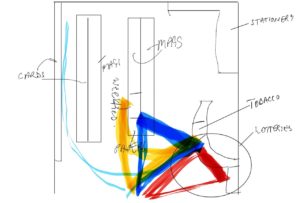 This rough sketch by me represents a traditional Newsagency layout. It is close to what shopfitters designed for newsagents, encouraged by Tatts, newspaper publishers and magazine, card and stationery companies.
This rough sketch by me represents a traditional Newsagency layout. It is close to what shopfitters designed for newsagents, encouraged by Tatts, newspaper publishers and magazine, card and stationery companies.
Everyone wanted their space. And they got it. Little regard was paid to what was right for the business, for its future. Little was known.
No one invested time in understanding the whole business. Newsagents too often did not think about the bigger picture because, too often, they were not retailers.
So, newsagents ended up with a zoned business that was inflexible and at its heart, selfish for the suppliers.
Sadly, there are Newsagency businesses with layouts like or close to this today.
The bold colours on the drawing represents floor traffic for the key traffic driving product categories. I know from years of basket analysis that lottery, weekly magazine and newspaper customers rarely purchase any other product.
Take newspapers, around 75% of newspaper purchases in newsagencies do not include any other product category. For lotteries that number is close to 80%. For weekly magazines, on the day of issue, the number is 65%.
The shop layout encourages inefficiency in these products. Lotteries are the worst, demanding front of store location and barring other products from their location.
Look at the red, blue and yellow trails of traffic. This is what I see in traditional newsagency businesses. The lines represent inefficiency. The show a business not leveraging traffic th way it should.
In this drawing you can see a core reason news agencies are closing in Australia right now. They have not been built to cope with change. Shame on everyone, involved. Shame o,n those continuing to build businesses like this today.
Back in 2009 I designed a plug and play newsagency, one where it could be relayed without a shopfitter, changed dramatically, evolved to serve evolving needs. The flexibility in the core structure of the business has helped it go thorough tremendous changes.
That was in 2009. I know of people who visited that shop and said it was too radical, went on to build an old school business and got out losing money years later.
For years, through this blog and through the work I do with newsXpress, I have been speaking about the need for change to commence on the shop floor. I am pleased to see that happening. But it is not happening in enough businesses.
Newsagents have to push back hard on any supplier who demands space allocated to their category and it alone. They have to push back on suppliers who demand front of store. These pressures need to have a commercial reason, something you can bank on. A simple demand is no longer enough. We are better than this.
My advice to newsagents is to look at your foot traffic. Fast forward through camera footage. See your hot spots and see how you are not leveraging traffic to its fullest potential.
You want to work on this before it is too late.
If you have an old school Newsagency like in my sketch, change, now, quickly, the radically.
Structure your newsagency business to change the three key traffic flows, to get the deeper into the business and more integrated with the whole of the business rather than selfishly staying in the destination category.
The Newsagency of the future starts on the shop floor.


